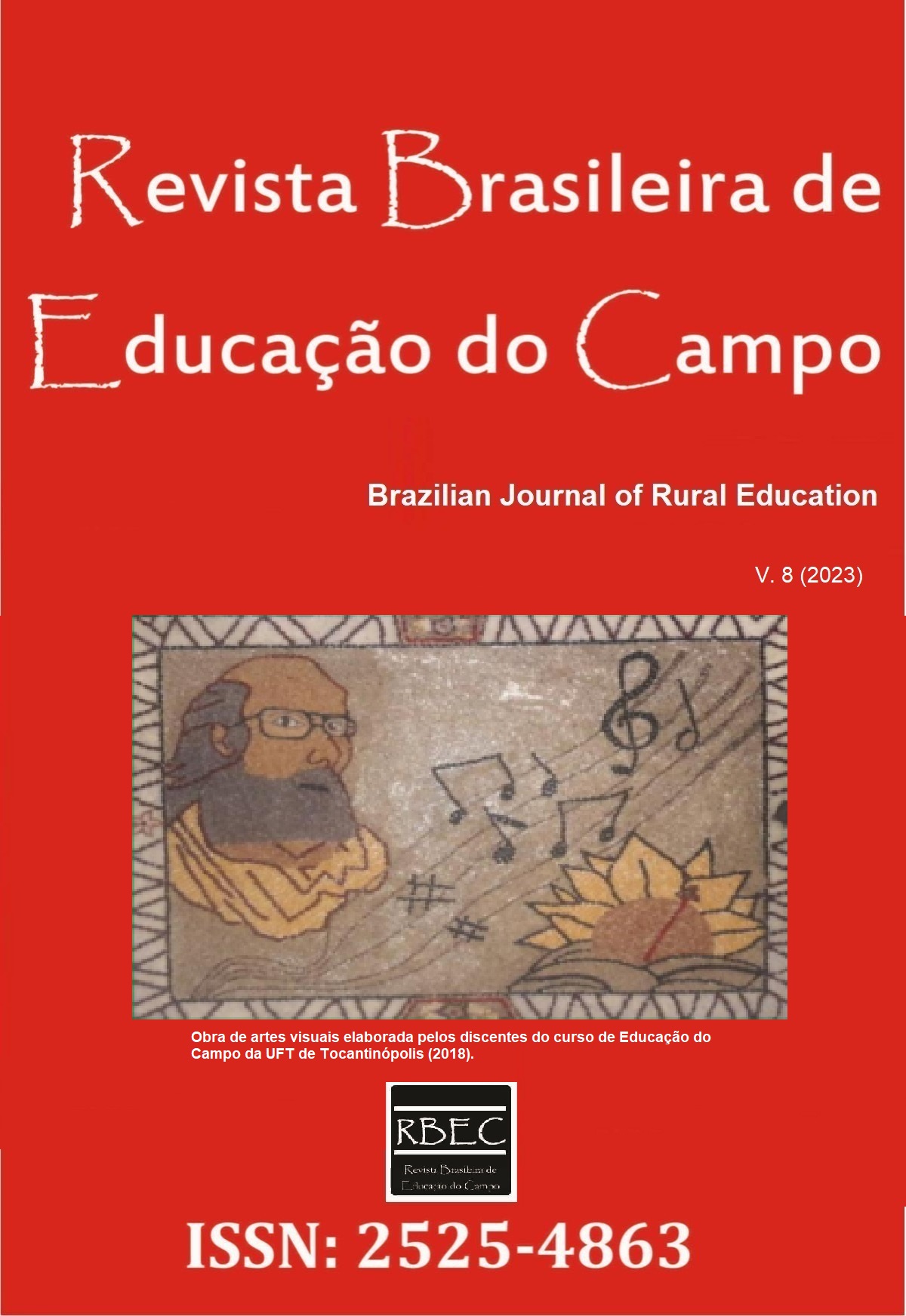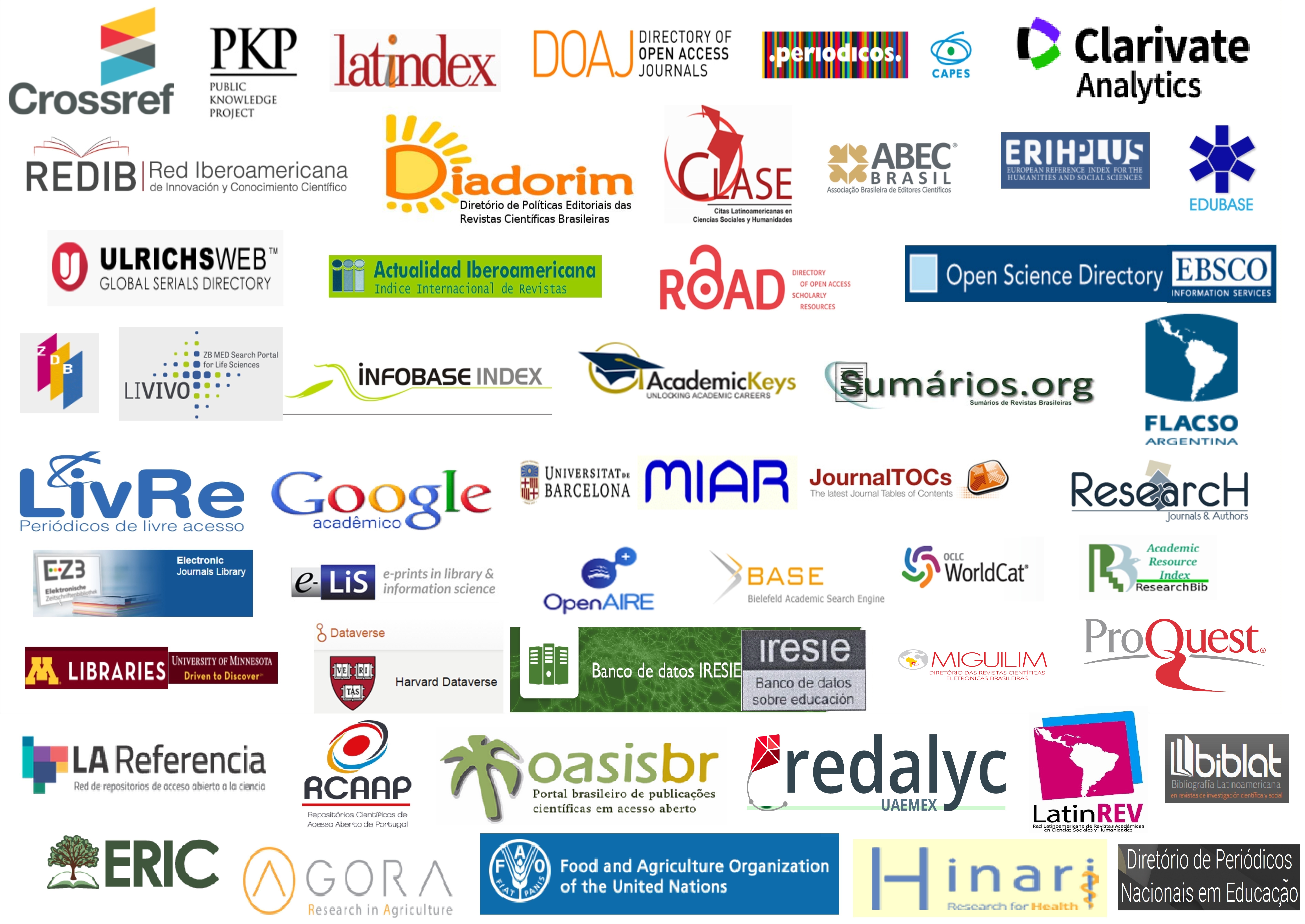A construção da Educação do Campo como política pública para a rede de ensino no Distrito Federal: dos pressupostos teóricos e metodológicos aos marcos normativos
DOI:
https://doi.org/10.20873/uft.rbec.e16364Resumo
O presente artigo se constitui de parte da pesquisa de mestrado que analisa como as Escolas do Campo de tempo integral do Distrito Federal implementam as Diretrizes Pedagógicas da Educação Básica do Campo para a Rede Pública de Ensino do Distrito Federal. De cunho qualitativo, a referida pesquisa teve como base epistemológica o materialismo histórico-dialético. O recorte do estudo que compõe o presente texto está embasado na pesquisa documental das diretrizes e normativas da Educação do Campo no DF, visando traçar os caminhos teóricos, metodológicos e normativos dessa modalidade de ensino. A fundamentação teórica se ancora nas ideias de pensadores como Arroyo (2007, 2012), Arroyo, Caldart e Molina (2011), Caldart (2012), Freire (2018), Freitas (2013, 2018), Kolling, Cerioli e Caldart (2002) e Molina e Sá (2012). Os resultados apontaram para um avanço na construção da política de Educação do Campo no DF, tratando-se dos instrumentos normativos como elementos de base política para a materialização do direito à educação dos povos do campo em seus territórios.
Palavras-chave: escola do campo, educação do campo, diretrizes pedagógicas, marcos normativos da EdoC.
The construction of Countryside Education as a public policy for the education network in the Federal District: from theoretical and methodological assumptions to normative frameworks
ABSTRACT. This article is part of the master's research that analyzes how the full-time countryside schools in the Federal District implement the pedagogical guidelines of Basic Education of the Field/countryside for the public school system in the Federal District. This qualitative research was epistemologically based on the Dialectical Historical Materialism. The study that makes up the present text is based on the documental research of the Guidelines and norms of Field Education in the Federal District, aiming to trace the theoretical, methodological, and normative paths of Field Education. The theoretical foundation is anchored in the ideas of thinkers such as Arroyo (2007, 2012), Arroyo, Caldart and Molina (2011), Caldart (2012), Freire (2018), Freitas (2013, 2018), Kolling, Cerioli and Caldart (2002) and Molina and Sá (2012). The results point out to an advance in the construction of the policy of Field Education in the DF, when it comes to normative instruments as elements of political basis for the implementation of the right to education of countryside people in their territories.
Keywords: countryside school, (rural area schools) countryside/rural education, pedagogical guidelines, EdoC normative framework.
La construcción de la Educación del Campo como política pública para la rede de enseñanza en el Distrito Federal: de las hipótesis teóricas y metodológicos a los apuntes normativos
RESUMEN. El presente artículo se constituye de partes de la investigación de maestría que analiza el modo como las Escuelas del Campo de tiempo integral del Distrito Federal implementan las Directrices Pedagógicas de la Educación Básica del Campo para la Red Pública de Enseñanza del DF. En un abordaje cualitativo, la referida investigación tuvo con base epistemológica el materialismo histórico dialéctico. El recorte de estudio que compone el presente texto está basado en la investigación documental de las directrices y normativas de la Educación de Campo del Distrito Federal, con el objetivo de apuntar los caminos teóricos, metodológicos normativos de la Educación del Campo. La fundamentación teórica se ancla en las ideas de pensadores como Arroyo (2007, 2012), Arroyo, Caldart y Molina (2011), Caldart (2012), Freire (2018), Freitas (2013, 2018), Kolling, Cerioli y Caldart (2002) y Molina y Sá (2012). Los resultados apuntan en el sentido de un avanzo en la construcción de política de Educación del Campo en el Distrito Federal, en lo que se relaciona a los instrumentos políticos normativos como elementos de base política para la materialización del derecho a la educación de los pueblos del campo en sus territorios.
Palabras clave: escuela del campo, educación del campo, directrices pedagógicas, marcos normativos de la Edoc.
Downloads
Referências
Arroyo, M. G. (2007). Políticas de Formação de Educadores(as) do Campo. Cad. Cedes, Campinas, 27(72), 157-176. https://doi.org/10.1590/S0101-32622007000200004
Arroyo, M. G. (2012). Outros sujeitos, outras pedagogias. Petrópolis, RJ: Vozes.
Arroyo, M. G., Caldart, R. S., & Molina, M. C. (Orgs.). (2011). Por uma Educação do Campo (5a ed.). Petrópolis, RJ: Vozes.
Caldart, R. S. Educação do Campo. (2012). In Caldart, R. S., Pereira, I. B., Alentejano, P., & Frigotto, G. (Orgs.). Dicionário da Educação do Campo (pp. 257-265). Rio de Janeiro, RJ: Expressão Popular.
Freire, P. (2018). Pedagogia do Oprimido. Rio de Janeiro, RJ: Paz e Terra.
Freitas, L. C. (2013). A luta por uma pedagogia do meio: revisitando o conceito. In Pistrak, M. M. (Org.). A escola-comuna (2a ed.). São Paulo, SP: Expressão Popular.
Freitas, L. C. (2018). A reforma empresarial da educação: nova direita, velhas ideias. São Paulo, SP: Expressão Popular.
Kolling, E. J., Cerioli, P. R., & Caldart, R. S. (Orgs.). (2002). Educação do Campo: identidade e políticas públicas. Brasília, DF: Articulação Nacional Por uma Educação Básica do Campo.
Laraia, R. B. (2001). Cultura: um conceito antropológico (14a ed.). Rio de Janeiro, RJ: Jorge Zahar Editor.
Lucena, M. L. M. (2021). Educação integral em tempo integral no Distrito Federal: há tempos e espaços para o campo? Um estudo de caso na Escola Classe Ipê (Dissertação de Mestrado). Universidade de Brasília, Brasília, DF.
Molina, M. C., & Sá, L. M. (2012). Escola do Campo. In Caldart, R. S., Pereira, I. B., Alentejano, P., & Frigotto, G. (Orgs.). Dicionário da Educação do Campo (pp. 259-267). Rio de Janeiro, RJ: Expressão Popular.
Lei nº 5.499 − Plano Distrital de Educação 2015-2024 − PDE-DF. (2015, 14 de julho). Brasília, DF: Governo do Distrito Federal. Recuperado de http://www.educacao.df.gov.br/wp-conteudo/uploads/2018/01/pde_site_versao_completa.pdf
Portaria nº 419. (2018, 20 de dezembro). Brasília, DF: SEEDF. Recuperado de http://www.sinj.df.gov.br/sinj/Norma/22f15cb7822041529f2ab74109468f12/Portaria_419_20_12_2018.html
Resolução CEDF nº 1. (2018, 18 de dezembro). Brasília, DF: CEDF/SEEDF. Recuperado de http://cedf.se.df.gov.br/images/Resolu%C3%A7%C3%A3o_n%C2%BA_1-2018-CEDF_alterada_pela_Resolu%C3%A7%C3%A3o_n%C2%BA_2-2019-CEDF_e_pela_Resolu%C3%A7%C3%A3o_n%C2%BA_1-2020-CEDF.pdf
Ribeiro, D. M. C. (2018). A experiência de implantação da Educação do Campo na rede pública de ensino do Distrito Federal – 2012 a 2017. Cadernos RCC#15, 5(4), 176-184.
Secretaria de Estado de Educação do Distrito Federal. (2014a). Currículo em Movimento Educação Básica: pressupostos teóricos. Brasília, DF:
Secretaria de Estado de Educação do Distrito Federal. (2014b). Currículo em Movimento da Educação Básica da Secretaria de Estado de Educação do Distrito Federal. Brasília, DF:
Secretaria de Estado de Educação do Distrito Federal. (2015). Regimento Escolar da Rede Pública de Ensino do Distrito Federal (6a ed.). Brasília, DF: Autor. Recuperado de https://agenciabrasilia.df.gov.br/wp-conteudo/uploads/2016/10/regimento-escolar-rede-publica-de-ensino-df.pdf
Secretaria de Estado de Educação do Distrito Federal. (2019). Diretrizes Pedagógicas da Educação Básica do Campo para a Rede Pública de Ensino do Distrito Federal. Brasília, DF: Autor. Recuperado de https://www.educacao.df.gov.br/wp-conteudo/uploads/2019/03/Diretrizes-Ed-do-Campo-V6-JUL2020-2.pdf
Souza, C. M. (2018). Da educação rural à Educação do Campo: caminhos percorridos por escolas no meio rural do Distrito Federal (Dissertação de Mestrado). Universidade de Brasília, Brasília, DF.
Publicado
Como Citar
Edição
Seção
Licença
Copyright (c) 2023 Maria Lucimar Matos de Lucena, Mônica Castagna Molina

Este trabalho está licenciado sob uma licença Creative Commons Attribution 4.0 International License.
Proposta de Aviso de Direito Autoral Creative Commons
1. Proposta de Política para Periódicos de Acesso Livre
Autores que publicam nesta revista concordam com os seguintes termos:
a. Autores mantém os direitos autorais e concedem à revista o direito de primeira publicação, com o trabalho simultaneamente licenciado sob a Licença Creative Commons Attribution que permite o compartilhamento do trabalho com reconhecimento da autoria e publicação inicial nesta revista.
b. Autores têm autorização para assumir contratos adicionais separadamente, para distribuição não-exclusiva da versão do trabalho publicada nesta revista (ex.: publicar em repositório institucional ou como capítulo de livro), com reconhecimento de autoria e publicação inicial nesta revista.
c. Autores têm permissão e são estimulados a publicar e distribuir seu trabalho online (ex.: em repositórios institucionais ou na sua página pessoal) a qualquer ponto antes ou durante o processo editorial, já que isso pode gerar alterações produtivas, bem como aumentar o impacto e a citação do trabalho publicado (Veja O Efeito do Acesso Livre).
Proposal for Copyright Notice Creative Commons
1. Policy Proposal to Open Access Journals
Authors who publish with this journal agree to the following terms:
A. Authors retain copyright and grant the journal right of first publication with the work simultaneously licensed under the Creative Commons Attribution License that allows sharing the work with recognition of its initial publication in this journal.
B. Authors are able to take on additional contracts separately, non-exclusive distribution of the version of the paper published in this journal (ex .: publish in institutional repository or as a book), with an acknowledgment of its initial publication in this journal.
C. Authors are permitted and encouraged to post their work online (eg .: in institutional repositories or on their website) at any point before or during the editorial process, as it can lead to productive exchanges, as well as increase the impact and the citation of published work (See the Effect of Open Access).














